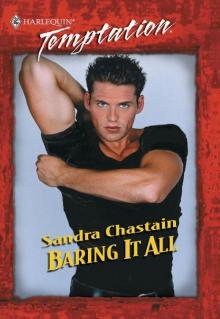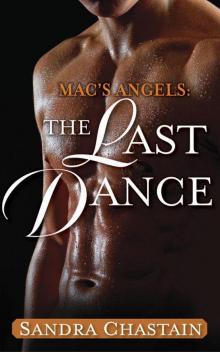- Home
- Sandra Chastain
Mac's Angels Page 6
Mac's Angels Read online
Page 6
“Preston? I thought that was you. I didn’t know that you and Ms. Fallon were—friends.”
“Oh, yes. Old friends. We met ten years ago in Berlin.” He smiled at her.
“And what brings the two of you together again?” Brighton asked casually.
“We ran into each other recently in New York, at a party for the new international director of trade.”
“I was out of the country then, but I heard it was quite an affair. I was sorry I missed it.”
“Do join us, Kilgore.”
“Yes. Please sit down, Mr. Kilgore,” Erica added.
The man glanced across the restaurant, then pulled out a chair and took a seat. “Just for a moment. I have dinner guests. But please, call me Brighton. Committee meetings are business. Here we’re all friends. What brings you two to New Orleans?”
Conner answered easily. “Why, Christmas, of course. We decided to get away for the holidays, spend some time together. Erica fancied someplace warm, and I had business here.”
Kilgore pulled his gaze away from Erica. “Oh? What kind of business?”
“I’m searching for a very special piece of artwork. My client heard a rumor that you own it. I’m supposed to find out if you would consider selling it.”
“And what piece is that?” Brighton asked.
“A statue of the Virgin Mary that disappeared during the German occupation of France during World War Two.”
Kilgore suddenly looked at Erica. “I see.”
Erica caught his quick frown before she leaned forward and smiled. “I told him you owned it, Brighton. I didn’t think it was a secret. Was it?”
“Well, no, not really. But I expected anything we discussed in the committee to remain private, Erica.”
“Oh, dear. I’m so sorry. I told Conner I’d ask you to let us see it. I’m sure he won’t say anything, will you, darling?”
“Of course not. Is the piece authentic?”
“Certainly,” Brighton snapped, “I had it authenticated on delivery. The Virgin Mary may be my finest acquisition. I’m not interested in selling, but I’ll be glad to show it to you while you’re in New Orleans.”
“Good,” Conner said.
“Perhaps if you’re successful in locating other pieces like it, you might allow me the opportunity to buy them. And”—he nodded at Erica—“our committee will be most interested in anything you learn.”
“I thought you’d know where the statue came from.”
“No, it came to me from a dealer who bought it from another dealer. You know how that goes. I’ve run into a dead end, even after offering to buy the information.”
“For the committee, of course,” Conner said.
“Of course. My wife and I are having a small dinner party tomorrow evening. Won’t you join us? I think you’d enjoy touring our home, Erica. The architecture is very unusual. It’s German.”
“I’d love to see it, Mr. Kilgore.”
“Now, now. It’s Brighton, remember?” He stood and glanced across the restaurant. “I’d love to stay and talk art with you, but I really ought to get back to my guests. Why don’t I have a car pick you up in front at six-thirty? The house is about a half hour’s drive up river.”
“We’ll be ready.” Conner reached out to shake Kilgore’s hand. “Until tomorrow night.”
“Bring a wrap, Erica. Traditionally people along the river build bonfires on the levee on Christmas Eve. But the weatherman says that a storm will be moving in, so we’re lighting our bonfire a day early.”
“That sounds exciting.” Erica shook his hand and watched him walk away. She waited until her racing pulse settled back down before she launched into Conner. “Why did you tell him about Berlin? Isn’t that giving away too much?”
“I’m going to assume he already knew. If not, he’ll make it a point to find out. Either way, we’ve offered them a connection to Berlin. It’s up to him or whoever is pulling the strings to make the next move.”
Their soup arrived, temporarily halting the discussion. Erica was glad of the distraction, but the lump in her throat made it impossible for her to enjoy the dinner. The false sense of intimacy he was creating made her very uncomfortable. The vague feeling of unease in her belly had turned into a maelstrom of discomfort.
“Don’t you like your soup?” he asked.
There was no way she would let him know how his words had affected her. “It’s very good.” The quiver in her voice threatened to give her away. “I’m afraid I’m just not very hungry.”
“Possibly because you’re exhausted,” Conner said with a quirk of his lips. “You didn’t get much sleep last night.”
He was more right than he knew. What sleep she had gotten came in little snatches between moments of observing Conner while he looked out the window. But there was no reason for him to know that. They’d better get back to business.
“I was an art history major, Conner. You probably know more about the missing pieces than I do,” she said in dismay.
He gave her an unexpected slow grin that made the corners of his eyes crinkle and melted the frost in their icy blue color. “I don’t know much about art, my Dragon Lady. But Sterling is an expert and keeps me fully informed.”
He reached out and took her hand again. “It’s going to be all right, Erica. I’ll make it all right.”
Erica didn’t know if it was his smile or his words, but suddenly everything changed. Her shortness of breath disappeared and her appetite resurfaced. The waiter returned, removing the soup bowls and replacing them with large plates filled with thin slices of lamb and new potatoes. Erica glanced around.
In the soft light of the candles, the other diners disappeared. For now Erica let herself relax as much as she could in the light of Conner’s solicitous attention. They’d be back in their suite much too soon, but she wouldn’t allow herself to think about that. For now she would play her role in their charade of reunited lovers. And if she could make him uncomfortable, that would suit her just fine.
Lifting her eyes, she watched Conner take a lusty bite of his food and tried her own, surprised by the tenderness of the meat.
Conner finally spoke, interrupting her thoughts. “You may claim not to be an art expert, Erica, but I remember Bart raving about how bright you were.”
That statement caught Erica by surprise. Bart had been a dedicated student, not given to loose praise. “I’m afraid your brother gave me more credit than I deserved. Truthfully, I never quite understood why he spent so much time with me.”
“Because you were smart and dedicated. Bart valued hard work. I don’t know why he ever put up with me. All brawn and no brains.
“Bart always said you had a big heart. He knew us both—very well.”
Then, as if they’d reached some sort of unspoken agreement, they both smiled and turned to their food, finishing the meal with no further reference to either Brighton Kilgore or Berlin.
Only once did Conner refer to the past, when he asked, “So how’d you get from art history to politics?”
“You mean how’d I go to work for the ambassador? Actually, it happened by chance. I was in Paris when he was transferred there from Berlin. I’d been … ill.” She focused her gaze on her plate. “Some friends dragged me to a party. It was the first time I’d been out in a long time. Ambassador Collins and I were introduced. He’d known my father. When he learned I was at … loose ends, he offered me a position as his assistant.
“I discovered I liked the work. Ambassador Collins’s wife died. A man in his position needs someone to organize his social calendar as well as an administrative assistant. Being shot at isn’t one of the usual job qualifications.”
“You’ve been involved in the diplomatic community for the past ten years and this is the first time you’ve been in danger?”
“Threats are a part of the job when you’re in foreign service, but they’re not usually personal. What are you getting at?”
“Nothing,” he said, entirely too ca
sually. “I was just wondering why somebody decided to threaten you now.”
“I’ve been thinking about that myself. Maybe it’s because of the committee. I’m suddenly involved in a public search for lost art.”
“I thought the committee had just been formed.”
“We’ve had only one meeting, and it was an organizational one,” she said. “I still can’t believe what happened.”
Neither could Conner. He didn’t want to think that these incidents were tied to their relationship in West Berlin. He didn’t want Erica to believe that either. “Maybe we’re wrong about all this. Maybe this has nothing to do with what happened ten years ago. Could the book have something to do with the embassy?”
“If you’re asking if the embassy has a little black book of spies and secret agents, sorry, no. And my personal address book is very dull. I don’t see the connection. Unless …” She looked straight at Conner. “Unless I’m not the real target.”
“It’s too soon to know. And I hate not knowing what’s going on around me. But let’s don’t worry about that tonight. What do we want for dessert?”
Erica pursed her lips and considered his question with more concentration than it warranted. “What I’d really like,” she whispered, “is to get out of here, go for a walk, and do something normal like have some beignets and café au lait.”
And work off some of the tension.
“Not a good idea, Erica. You know what happened before when you left the hotel.”
“Conner, I do not intend to spend the rest of my life in hiding. Please?”
He was moved by the plea in her voice. Besides, after today’s warning, they were probably safe, for tonight anyway.
“You’re on.” Conner signed the bill, stood, and pulled out her chair. It seemed only natural for him to touch her, guiding her through the restaurant and toward the elevator.
She stopped for a moment in front of the glass window overlooking the river. “It’s so beautiful. Can we take the Moon Walk and watch the boats go by?”
“Not with you in that dress. They’d all crash. Let’s change into something dark. And wear a cap or a scarf. Something to conceal your face.”
In their suite, they separated to change. Erica stepped out of her silver slippers and red hose, then reached for the zipper at the back of the dress. Giving it a jerk, she felt it move for a second, then hang on something. Damn! What was it with her and zippers? The more she pulled, the worse it got. Why hadn’t she bought the dress without a back?
Finally, she admitted defeat and opened her bedroom door. “Conner, could you give me a hand?”
Tugging on a sweater, he crossed the parlor and stopped in surprise. “You’re still dressed.”
“I—I can’t seem to get my zipper open. Could—could you help me?”
“Of course.” But the task proved more difficult than either expected. Finally, in exasperation, Conner gave a jerk to the tongue and Erica heard a rip.
“Oops.”
“Conner, do you have any idea how much this dress cost?”
Now was not the time to let Erica know that he’d had its cost added to his bill. Instead, he tried to look humble as she caught its sides and held the garment up. “I’m so sorry, Erica. I’ll have it repaired. Don’t worry.”
“I may just let you do it,” she said, remembering the touch of his hands on her back. Her skin felt as if it had been fingerpainted with fire. “Now get out of here and let me dress.”
“Are you sure you don’t need some help with—with the stockings?”
“They’re gone already. I can manage.”
Erica hoped he couldn’t hear the catch in her voice. To cool her heated skin she headed toward the closet, then turned to see what he was wearing.
Big mistake. Conner was dressed all in black, including the knitted cap that covered his blond hair.
She couldn’t hold back a grin. “Are we pulling a caper later, boss?”
“I certainly hope so,” he replied. “Remember, midnight is the witching hour.”
A small boat decorated with a wreath and Christmas lights moved slowly along the bank. In the middle of the river a second boat sported a brightly lit Christmas tree with a star shining like a beacon in the darkness.
Erica drew in a deep breath as a quick little breeze danced across the Mississippi and caught her hair, dragging a strand from her braid and brushing it across her face. She shivered and crossed her arms over her chest.
“Cold?”
“A little. It’s the dampness.”
Conner slid his arm around her, drawing her close.
She struggled for a moment, until she felt the sharp jab of metal poking into her side. His gun. Even now he was prepared to defend her if need be. She’d never had anybody show this kind of concern for her. It made her feel humble.
“Once we get to the café, I’ll be fine,” she said. “You’re fine now,” he said. “Listen.” He stopped for a second.
“Christmas carols. Where is the music coming from?”
“Don’t know. St. Louis Cathedral is ahead. Maybe they’ve opened it for services. Want to check it out?”
“Yes, let’s.”
They headed toward Jackson Square, where a crowd had gathered to listen to the carolers in front of the church.
The area between the iron fence that surrounded Jackson Square and the carolers was packed. Conner pushed Erica in front and stood behind her, sliding his arms around her waist to protect her from being jostled by the crowd.
Erica tried to put some distance between them, until she remembered the stranger in the street. Then she gave in to the need to be safe and nestled in Conner’s arms, letting the sound of the music sweep over her.
When the singers launched into the lighter tunes like “Jingle Bells” and “Rudolph,” the listeners clapped and joined in. Gradually the carolers grew more serious, ending their performance with “Silent Night.” Before the song ended, Conner drew Erica through the crowd and along the fence toward the French market.
“The Quarter never changes, does it?” Erica asked as they reached the French market with its giant Christmas tree decorated with fruits, vegetables, and bells. She could see the Café du Monde just ahead of the crowd.
“Not much. Years ago the city wrote up ordinances to keep the quarter just like it always was. Other than those already here, they even banned new neon lights, except on the first seven blocks of Bourbon Street.”
“I didn’t know that. I’ve only been here once—years ago.”
“You’ve never been to Mardi Gras?”
“No, is that un-American?”
“Absolutely. When this is over, we’ll—” His voice stopped short of the obvious completion of his sentence. “Look, our destination. And there’s no line and there’s a vacant table.”
Quickly Conner made his way toward the small table with the two wrought iron chairs. The “we” had stopped him. Erica pushed aside any comment and directed her attention to the bustle of the customers lining up behind them to be seated.
Moments later he gave their order and before they could reclaim the intimacy they’d shared at the church, the waiter had returned with a tray holding two milky-white coffees and a platter of sugary confections. Erica took her cup and moved it in front of her, wondering where the closeness had gone.
She felt like a yo-yo, plunging from the highest mountains to the lowest valleys in a matter of moments.
Conner slid his chair nearer. “It’s all right, Erica. You can relax. I’m not going to attack you.”
She took a swallow of the steaming liquid and felt it burn the tip of her tongue. “I know.”
“If it makes it easier for you, just tell yourself that this is all for show.”
Erica glanced around. Conner was right. Her enemy could be watching right now. There was more at stake than a trip down memory lane with Conner Preston. The ambassador had already been wounded and only because of Conner’s knowledge and quick reflexes had they escap
ed the second shooter. Erica had been given three warnings. Until they learned who was behind this bizarre plot, she had no choice but to go along with the charade. She certainly didn’t have any better plan.
She could put some space between herself and Conner though. Once they got back to the hotel, she planned to insist on being moved to another room.
But an hour later, when they opened the door to the suite, the room had been completely ransacked.
SIX
“Wait here,” Conner whispered, shoving her to the wall beside the open door and drawing his pistol. Like smoke he moved across the room, peering first into his room, then hers, then back again.
“It’s okay.”
But it didn’t look okay. Pictures hung at an angle. Chair cushions had been tossed to the floor. Drawers were open with clothing spilling over the edges. Even the covers had been ripped off the beds.
The backs of Erica’s knees turned to jelly, and she grasped a chair to support herself. “What were they looking for?”
“I don’t know,” Conner answered as he picked up the phone. “But a good guess is that they’re still looking for the ‘book.’ ”
“But I don’t have any book. I don’t know anything about a book. Conner, what are we going to do?”
“The first thing we’re going to do is get another room for the night while security goes over this one.” He cut his gaze back to the desk as he spoke into the phone. “Security, this is Conner Preston. We’ve had an intruder. Get up here and bring the manager.”
Half an hour later, they’d been moved into another suite and a guard had been stationed outside the door in the foyer.
Conner led Erica to the bedroom. “Take a nice hot bath and relax. I’ll get you a nightgown.”
“But—”
“You’ll be safe here. I promise.”
“You’ll come back?”
“Of course. It’s almost midnight.” He gave her a tired and gentle smile before he left.
Erica looked around the new room, this time not noticing the lavish furnishings. She felt empty and strung out.
Maybe it was Conner’s concern that brought back old memories and filled her with longings both new and old.

 The Redhead and the Preacher: A Loveswept Historical Romance
The Redhead and the Preacher: A Loveswept Historical Romance Baring It All (Mills & Boon Temptation)
Baring It All (Mills & Boon Temptation) Adam’s Outlaw
Adam’s Outlaw Mac's Angels: The Last Dance: A Loveswept Classic Romance
Mac's Angels: The Last Dance: A Loveswept Classic Romance Imaginary Lover
Imaginary Lover The Judge and the Gypsy
The Judge and the Gypsy Silver Bracelets: A Loveswept Contemporary Classic Romance
Silver Bracelets: A Loveswept Contemporary Classic Romance Penthouse Suite
Penthouse Suite Lean Mean Loving Machine: A Loveswept Classic Romance
Lean Mean Loving Machine: A Loveswept Classic Romance Joker's Wild
Joker's Wild Raven and the Cowboy: A Loveswept Historical Romance
Raven and the Cowboy: A Loveswept Historical Romance Night Dreams
Night Dreams The Outlaw Bride
The Outlaw Bride Scarlet Butterfly
Scarlet Butterfly Mac's Angels
Mac's Angels Run Wild With Me
Run Wild With Me Lean Mean Loving Machine
Lean Mean Loving Machine